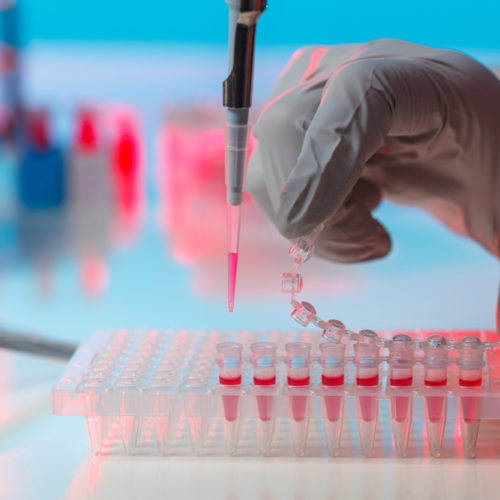Scientists have developed a new CAR T-cell immunotherapy strategy that uses light to activate the immune cells specifically in cancerous regions. The approach, which worked well in mice, may help reduce treatment-related side effects in cancer patients. The study, “Engineering light-controllable CAR T cells for cancer immunotherapy,” was published in the journal Science Advances. Chimeric…
Category: Cancer
Fewer, Higher Doses of Radiation Therapy Safe for Early Breast Cancer
For people with early breast cancer, delivering radiation therapy in fewer, larger doses does not increase the risk of long-term side effects from treatment, a new study demonstrates. The study, “Ten-Year Results of FAST: A Randomized Controlled Trial of 5-Fraction Whole-Breast Radiotherapy for Early Breast Cancer,” was published in the Journal of Clinical Oncology. Radiation therapy,…
Devyser’s Gene Screening Test for Breast, Ovarian Cancers Approved in Europe
Devyser’s hereditary breast and ovarian cancer (HBOC) test has received a CE mark from the European Commission and is now approved as a diagnostic test for both cancers in Europe. The CE mark is a certification for products sold in the European Economic Area to indicate the product has met all legal standards, and has been evaluated to meet…
EU Certifies Software That Assesses Short-term Breast Cancer Risk
ProFound AI Risk, a diagnostic tool that estimates the risk of breast cancer over a two-year period following a mammogram, has received a CE mark from the European Commission. The CE mark is a certification for products sold in the European Economic Area to indicate the product has met all legal standards, and has been evaluated to…
Trodelvy Better Than Chemo at Prolonging Survival in Advanced TNBC, Trial Shows
Immunomedics has announced that its Phase 3 ASCENT trial of Trodelvy (sacituzumab govitecan) met its main goal of demonstrating that the medication is superior to standard chemotherapy at delaying disease progression and prolonging the survival of people with metastatic triple-negative breast cancer (mTNBC). The biopharmaceutical company had closed ASCENT (NCT02574455) early, in April, due to…
Diet Rich in Fiber Linked to Lower Breast Cancer Risk, Pooled Data Show
A diet high in total fiber appears to lower the risk of breast cancer for both pre- and postmenopausal women, researchers who pooled data from 20 observational studies reported. This association was found valid for different sources of fiber — foods like cereals, fruits, vegetables, and legumes that make up total fiber. But links between diet and…
FDA Approves Bavencio Maintenance Therapy for Advanced Bladder Cancer
The U.S. Food and Drug Administration (FDA) has approved Bavencio (avelumab) as a first-line maintenance therapy for people with advanced urothelial carcinoma — a type of bladder cancer — whose disease did not worsen while receiving platinum-based chemotherapy. The decision was based on data from the ongoing JAVELIN Bladder 100 Phase 3 trial (NCT02603432). That data…
1,066 Myeloma Patients Answer HealthTree Survey of COVID-19’s Effects
Over some four weeks, 1,066 people with multiple myeloma took part in a survey sponsored by HealthTree to better understand how COVID-19 is affecting life for those with this blood cancer. The survey, announced on April 16, aims to provide patients and physicians with information that will help guide future healthcare decisions. It assesses myeloma patient vulnerability, and…
FDA Approves Keytruda as First-line Therapy for Certain Advanced Colorectal Cancers
The U.S. Food and Drug Administration (FDA) has approved Keytruda (pembrolizumab) as a first-line therapy for people with inoperable or metastatic colorectal cancer with specific genetic features that denote a high mutation rate. The decision comes after promising findings from KEYNOTE-177 (NCT02563002), a Phase 3 trial in which Keytruda more than doubled the time patients lived…
FDA Approves Phesgo as Injection Treatment for HER2-positive Breast Cancers
The U.S. Food and Drug Administration (FDA) has approved Phesgo, an under-the-skin injection of Perjeta (pertuzumab) and Herceptin (trastuzumab) with hyaluronidase, as a faster and more convenient alternative to treat people with HER2-positive breast cancer. The approval of this fixed-dose combination is for use with chemotherapy in early and metastatic breast cancers, the same indications for which the…











